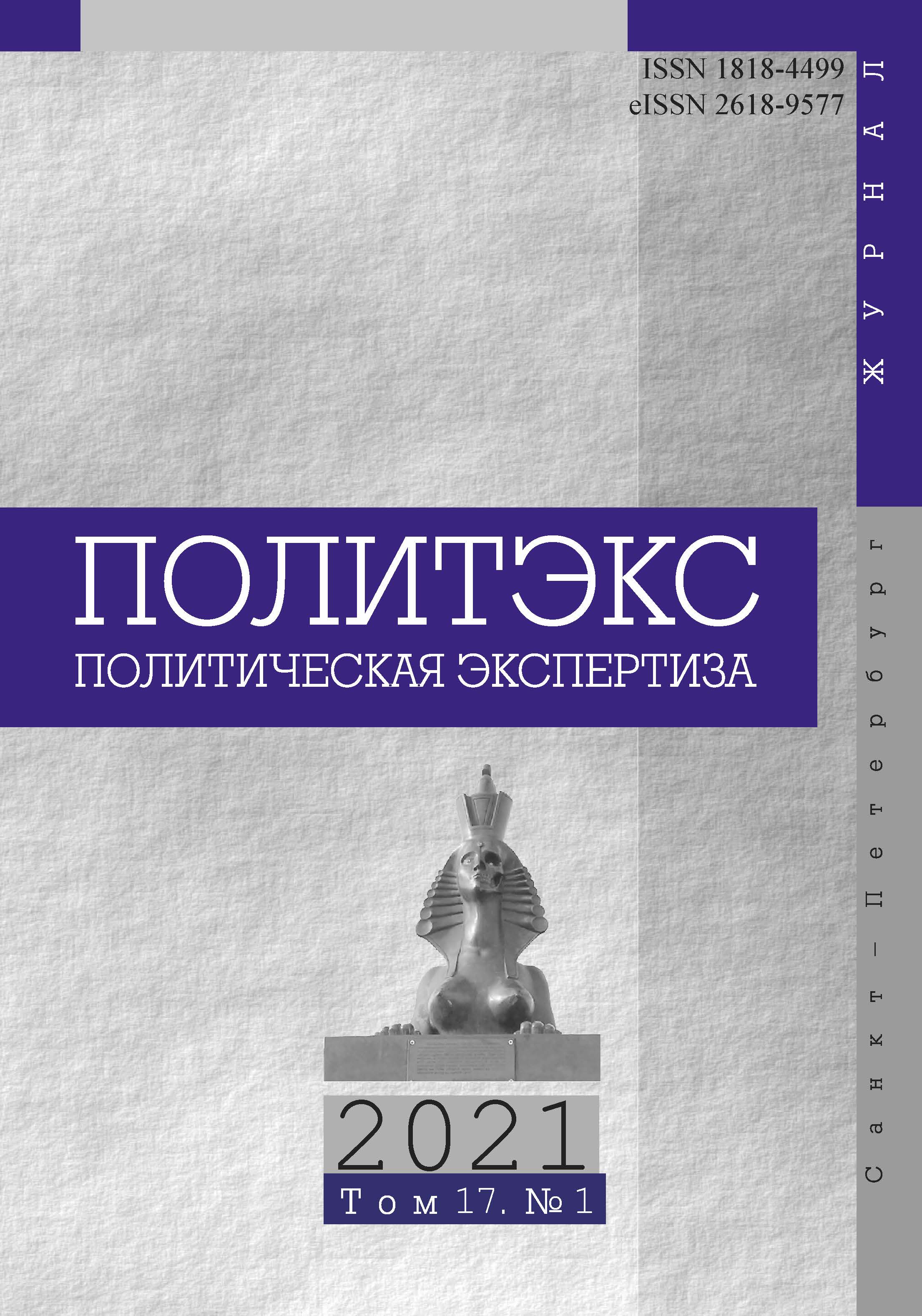THE POLITICAL WORLDVIEW OF VKONTAKTE COMMUNITIES: THE EXPERIENCE OF ANALYZING THE SUBJECTIVE SPACE OF POLITICS IN A NETWORK SOCIETY
DOI:
https://doi.org/10.21638/spbu23.2021.107Abstract
The article presents the results of a theoretical analysis of the political worldview as part of the subjective space of politics in a network society and its empirical verification. The author shows that the integration of phenomenology and the network approach allows researchers to advance their understanding of content and parameters of the political worldview of network communities as part of the subjective space of modern public policy. The analysis of the discourse of network communities makes it possible to identify, describe and analyze the features of their political worldview. The author presents an original methodology, created within the framework of the RFBR research project "Subjective Space of Politics: Opportunities and Challenges of a Network Society", for studying the political world view of network communities and the empirical results obtained with its usage. In particular, the typology of political worldviews existing in network communities is described. It reflects the structural and substantive components of the political worldview in the discourse of network communities: the core of the political worldview (reflecting the ontological level of the political worldview, including images of the Motherland, state, power), political roles, political institutions (the last two clusters reflect the basic level of the political worldview elements), political participation (reflects the instrumental level of the political worldview), socio-political problems). The typology of political worldviews of network communities identified (zero, horizontal, non-political, activity and political world view of active resistance) requires verification in further research. An important result of the empirical analysis is the identification of two political worldview profiles (closed and open) and their connection with the dominant type of participant socio-political activity in network communities. Further study in this direction will improve analytical and predictive tools for research and practical work with network communities.
Keywords:
subjective space of politics, political worldview, network society, network communities
Downloads
References
Гуссерль Э. Избранные работы. М.: Территория будущего, 2005. 464 с.
Идейно-символическое пространство постсоветской России: динамика, институциональная среда, акторы / под. ред. О. Ю. Малиновой. М.: Российская ассоциация политической науки (РАПН); Российская политическая энциклопедия (РОССПЭН), 2011. 285 с.
Идентичность: Личность, общество, политика. Энциклопедическое издание / под ред. И. С. Семененко. М.: Весь мир, 2017. 992 с.
Лапкин В. В., Семененко И. С. «Человек политический» перед вызовами «infomodernity» // Полис. Политические исследования. 2013. № 6. С. 64–81.
Малинова О. Ю. Современные тенденции развития символического пространства политики и концепт идеологии (материалы дискуссии) // Полис. Политические исследования. 2004. № 4. С. 28–51.
Морозова Е. В., Мирошниченко И. В., Рябченко Н. А. Фронтир сетевого общества // Мировая экономика и международные отношения. 2016. T. 60, № 2. С. 83–97.
Найбет Т., Рода К. Виртуальные социальные пространства: подходы, практики, перспективы // Социологический ежегодник 2009: сб. науч. тр. / под ред. Н. Е. Покровского, Д. В. Ефременко. М.: РАН, 2009. C. 301–307.
Рябченко Н. А., Гнедаш А. А. Online и offline социальные сети: к вопросу о математическом обосновании стохастической модели функционирования // Политическая Экспертиза: Политэкс. 2014. Т. 10, № 3. С. 91–100.
Самаркина И. В. Политическая картина мира // Идентичность: Личность, общество, политика. Энциклопедическое издание / под ред. И. С. Семененко. М.: Весь мир, 2017. 992 с.
Шестопал Е. Б. Введение в рубрику. Человеческое измерение политики // Полис. Политические исследования. 2013. № 6. С. 6–8.
Шюц А. Избранное: Мир, светящийся смыслом. М.: Российская политическая энциклопедия (РОССПЭН), 2004. 1056 с.
REFERENCES (In English)
Castells M. The Rise of the Network Society: The Information Age: Economy, Society and Culture. New York: John Wiley & Sons, 2000. 481 p.
WebCanape. Вся статистика Интернета на 2019 год — в мире и в России. 2019. URL: https://www.web-canape.ru/business/socialnye-seti-v-2018-godu-globalnoe-issledovanie/ (дата обращения 1.09.2019).
Castells M. The Rise of the Network Society: The Information Age: Economy, Society and Culture. N.Y.: John Wiley & Sons, 2000. 481 p.
Husserl E. Selected Works. Moscow: Territoriia budushchego Publ. 2005. 464 p. (Rus. Ed.)
Identity: Personality, Society, Politics. Encyclopedic Edition, eds I.S. Semenenko. Moscow: Ves' mir Publ., 2017. 992 p. (In Russian)
Lapkin V. V., Semenenko I. S. "Political Man" Before The Challenges of "Infomodernity. Polis. Politicheskie issledovaniia, 2013, no. 6, pp. 64–81. (In Russian)
Malinova O. Yu. Modern Trends in The Development of the Symbolic Space of Politics and The Concept of Ideology (Discussion Materials). Polis. Politicheskie issledovaniia, 2004, no. 4, pp. 28–51. (In Russian)
Morozova E. V., Miroshnichenko I. V., Ryabchenko N. A. The Frontier of Network Society. Mirovaia ekonomika i mezhdunarodnye otnosheniia, 2016, vol. 60, no. 2, pp. 83–97. (In Russian)
Nabeth T. Roda C. Virtual Social Spaces: Approaches, Practices, Perspectives. Sociological Yearbook, 2009: collection of scientific works, eds N. Pokrovsky, D. Efremenko. Moscow: RAS Publ., 2009. pp. 301–307. (In Russian)
Ryabchenko N. A., Gnedash A. A. Online and Offline Social Networks: On The Mathematical Justification of the Stochastic Modal. Politicheskaia Ekspertiza: PolitEks, 2014, vol. 10, no. 3, pp. 91–100. (In Russian)
Samarkina I. V. Political Picture of the World. Identity: Personality, society, politics. Encyclopedic edition, eds I.S. Semenenko. Moscow: Ves' mir Publ., 2017. 992 p. (In Russian)
Schutz A. Chosen: A World Glowing with Meaning. Moscow: ROSSPEN Publ., 2004. 1056 p. (Germ. Ed.)
Shestopal E. B. Introduction to the Section. The Human Dimension of Politics. Polis. Politicheskie issledovaniia, 2013, no. 6, pp. 6–8. (In Russian)
The Ideological and Symbolic Space of Post-Soviet Russia: Dynamics, Institutional Environment, Actors, eds O. Yu. Malinova. Moscow: Russian Association of Political Science (RAPN) Publ.; Russian Political Encyclopedia (ROSSPEN) Publ., 2011. 285 p. (In Russian)
WebCanape. All Internet Statistics for 2019 are in the World and in Russia. 2019. Available at: https://www.web-canape.ru/business/socialnye-seti-v-2018-godu-globalnoe-issledovanie/ (accessed: 01.09.2019). (In Russian)
Downloads
Published
How to Cite
Issue
Section
License
Articles of "Political Expertise: POLITEX" are open access distributed under the terms of the License Agreement with Saint Petersburg State University, which permits to the authors unrestricted distribution and self-archiving free of charge.




